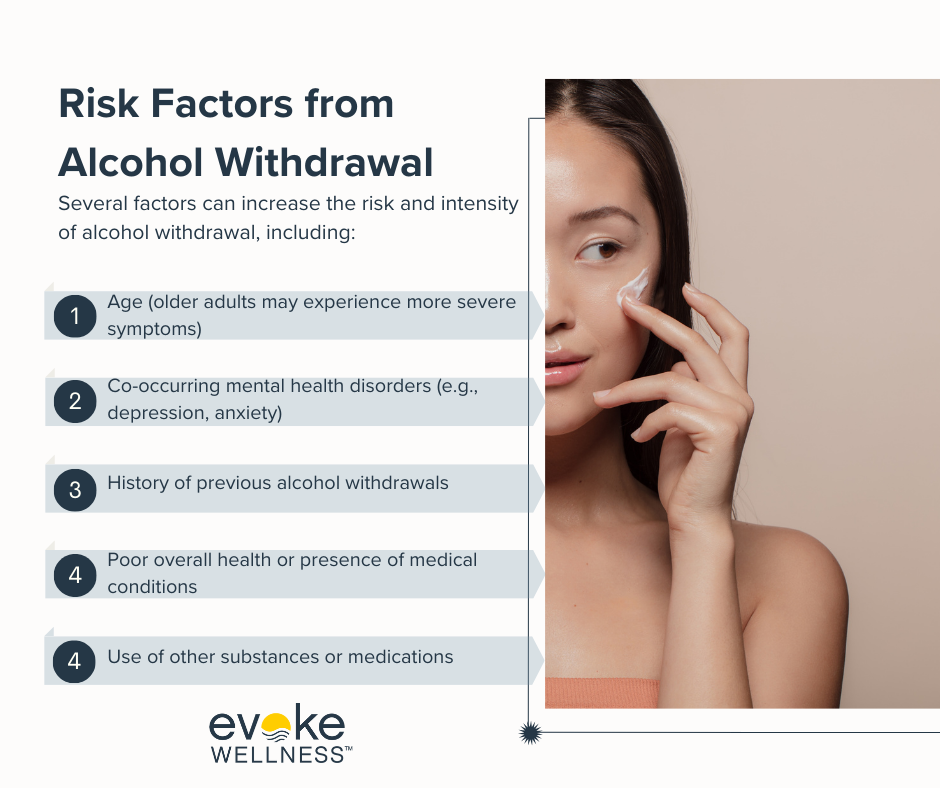Alcohol addiction is a pervasive issue affecting millions of Americans. When you decide to quit drinking, you may face challenging withdrawal symptoms that can be dangerous without proper medical supervision. Understanding alcohol withdrawals and detox options is crucial for a safe recovery journey. Recent studies show that approximately 14.5 million people aged 12 and older had an alcohol use disorder in 2019. This article will explore the process of alcohol detox, including acute detox services, residential treatment programs, and comprehensive substance abuse treatment options. By learning about these evidence-based approaches, you can make informed decisions about your path to sobriety and long-term wellness.
Together, let’s embrace the journey to recovery and the promise of a new beginning. Call us at (833) 949-1347 today or reach out online.
Alcohol Withdrawal Symptoms and Timeline
1. Acute Withdrawal Phase
- Typically begins 6-24 hours after the last drink
- Symptoms include anxiety, insomnia, nausea, sweating, tremors
- Can escalate to hallucinations and seizures without medical treatment
2. Early Withdrawal
- Occurs 12-48 hours after the last drink
- Heightened body temperature, irregular heart rate and blood pressure
- Severe alcohol cravings and mood disturbances
3. Peak Withdrawal Period
- Peaks around 2-4 days after the last drink
- Most intense and potentially life-threatening phase
- Delirium tremens (DTs) may occur, causing confusion, fever, agitation
4. Post-Acute Withdrawal
- Lasts for months after acute withdrawal
- Involves mood swings, sleep issues, fatigue
- Increased risk of relapse without comprehensive treatment
Withdrawal symptoms and timelines vary based on factors like drinking history, health status and genetics. Medically-supervised detox, counseling, medication and holistic therapies in an accredited treatment program provide the safest path through alcohol withdrawal to achieve full recovery.
Causes and Risk Factors for Alcohol Withdrawal
Alcohol Dependence and Heavy Drinking
Alcohol withdrawal symptoms occur when someone who has developed a physical dependence on alcohol suddenly stops or significantly reduces their drinking. The risk is highest for those struggling with alcohol use disorder (AUD) or chronic, heavy drinkers. According to the National Institute on Alcohol Abuse and Alcoholism (NIAAA), alcohol dependence affects over 14 million adults in the United States.
- Consuming large quantities of alcohol on a regular basis causes changes in the brain’s chemistry and function, leading to tolerance and dependence.
- When alcohol intake is abruptly stopped, the brain’s neurotransmitters become imbalanced, triggering withdrawal symptoms.
Duration and Amount of Alcohol Use
The duration and amount of alcohol consumed also play a significant role in the likelihood and severity of withdrawal symptoms.
- Research shows individuals who have been drinking heavily for prolonged periods (months or years) are at higher risk for more severe and potentially life-threatening withdrawal symptoms.
- Those who consume large amounts of alcohol daily or engage in binge drinking are also more susceptible to experiencing difficult withdrawals.
Importance of Professional Treatment
Due to the potential dangers of alcohol withdrawal, it is crucial for those struggling with alcohol dependence to seek professional help from addiction treatment centers like Evoke Wellness at Hilliard. Attempting to detox alone can be life-threatening. Medically-supervised detox programs provide a safe, controlled environment to manage withdrawal symptoms and initiate the path to recovery through comprehensive treatment plans tailored to individual needs.
Diagnosing Alcohol Withdrawal
Signs & Symptoms
Alcohol withdrawal can manifest in various ways, ranging from mild to potentially life-threatening. Some of the most common signs and symptoms to watch for include:
- Anxiety, irritability, and mood swings
- Confusion and difficulty concentrating
- Depression and fatigue
- Headaches and insomnia
- Nausea, vomiting, and loss of appetite
- Rapid heartbeat and sweating
- Shaky hands or tremors
In severe cases, individuals may experience hallucinations, seizures, or delirium tremens (DTs) – a state of profound confusion, agitation, and autonomic hyperactivity. These severe symptoms underscore the importance of seeking professional medical assistance.
Risk Factors
The severity of alcohol withdrawal symptoms can vary based on several factors, including the duration and intensity of alcohol abuse, underlying health conditions, and the presence of co-occurring mental health disorders.
Individuals with a history of severe withdrawal episodes, chronic medical conditions, or simultaneous substance abuse are at an increased risk of experiencing more severe withdrawal symptoms and complications.
Professional Evaluation
If you or a loved one is experiencing symptoms of alcohol withdrawal, it is crucial to seek immediate medical attention. Healthcare professionals can conduct a comprehensive evaluation, which may involve:
- Physical examination and medical history review
- Blood tests to assess liver function and electrolyte levels
- Screening for co-occurring mental health conditions
Based on this evaluation, professionals can determine the appropriate course of treatment, which may involve medically-supervised detox, medication-assisted treatment (MAT), or residential rehabilitation programs like those offered at Evoke Wellness.
Attempting to detox from alcohol without medical supervision can be extremely dangerous and potentially life-threatening. Professional evaluation and care are essential for a safe and successful recovery journey.
Treatments and Medication for Alcohol Withdrawal
Medically-Supervised Detox
A vital first step in recovering from alcohol addiction is medically-supervised detox to manage potentially severe withdrawal symptoms safely. Evoke Wellness Ohio’s drug detox center guides patients through the 5 key stages:
- Pre-detox preparation
- Withdrawal symptom onset
- Acute withdrawal
- Post-acute withdrawal
- Resolution and stabilization
This comprehensive approach ensures proper medical care, emotional support, and withdrawal management for a comfortable, secure detox process.
Medication-Assisted Treatment
After detox, medication-assisted treatment (MAT) can play a crucial role by reducing cravings and preventing relapse. Evoke Wellness offers several MAT program options:
- Vivitrol Treatment: This monthly injectable blocks opioid effects and minimizes alcohol cravings, reducing relapse risks.
- Suboxone Treatment: Containing buprenorphine and naloxone, Suboxone helps manage opioid withdrawal and cravings.
- Methadone Treatment: This long-acting opioid medication is used to manage opioid dependence.
Tailored MAT programs give patients vital physical support alongside counseling to address addiction’s mental and emotional aspects.
Therapy and Counseling
Overcoming alcohol addiction requires treating its underlying psychological drivers. At Evoke Wellness, MAT is combined with evidence-based therapies like cognitive-behavioral therapy (CBT), dialectical behavior therapy (DBT), and group counseling. This comprehensive approach equips patients with:
- Healthy Coping Mechanisms: CBT helps identify and change harmful thought patterns fueling addiction.
- Emotional Regulation Skills: DBT teaches mindfulness and distress tolerance techniques.
- Community Support: Group sessions foster accountability and shared understanding.
By addressing root issues through expert-guided therapy, patients build a strong foundation for lasting recovery.
Alcohol Detox and Withdrawal FAQs
What is alcohol withdrawal?
- Alcohol withdrawal refers to the symptoms that may occur after a person who has been drinking heavily cuts down or stops consuming alcohol entirely.
- Common symptoms include anxiety, insomnia, nausea, sweating, tremors, and in severe cases, seizures or delirium tremens (DTs).
How long does alcohol withdrawal last?
- Alcohol withdrawal symptoms typically begin within 6-24 hours after the last drink and peak around 24-72 hours.
- Mild symptoms may persist for a week or more, while some psychological symptoms like anxiety, depression, and sleep disturbances can last for months.
Why is medically-supervised detox recommended?
- Alcohol withdrawal can be potentially life-threatening in severe cases, with risks like seizures, dehydration, and heart complications.
- Medical detox programs provide around-the-clock monitoring and medications to manage withdrawal safely and comfortably.
- Attempting to quit “cold turkey” at home raises risks and makes relapse more likely due to intense cravings.
What happens during medical detox?
- Intake evaluation to assess alcohol history, health status, and appropriate level of care.
- 24/7 medical supervision and FDA-approved medications to ease withdrawal symptoms.
- Nutritional support and vitamin therapy to replenish depleted nutrients.
- Counseling and planning for next steps in comprehensive addiction treatment.
What comes after detox?
- Completing detox is just the first step – ongoing treatment is crucial for recovery.
- Options include inpatient/residential rehab, intensive outpatient programs, therapy, support groups, sober living, and aftercare planning.
- Comprehensive, evidence-based treatment gives the skills and support system to maintain long-term sobriety.
Conclusion
As you navigate the challenging journey of alcohol recovery, remember that professional support is crucial. Alcohol withdrawals and detox can be dangerous, even life-threatening, if not managed properly. Recent studies show that medically supervised detox programs increase successful recovery rates by up to 68%. Whether you choose an alcohol detox center, drug detox center, or a comprehensive substance abuse treatment program, trained medical staff can ensure your safety and comfort. Acute detox followed by residential treatment provides the strongest foundation for long-term sobriety. By taking this courageous step towards recovery, you’re investing in a healthier, more fulfilling future. Reach out today to explore your options and begin your transformation.
Begin Your Journey with Evoke Wellness at Hilliard
If you or a loved one is considering treatment, Evoke Wellness at Hilliard invites you to contact us. Our compassionate team is ready to answer your questions, discuss your needs, and help you take the first steps toward recovery. In Hilliard, you’ll find more than just a treatment program – you’ll discover a community dedicated to your wellness and success. Together, let’s embrace the journey to recovery and the promise of a new beginning. Call us at (833) 949-1347 today or reach out online.



